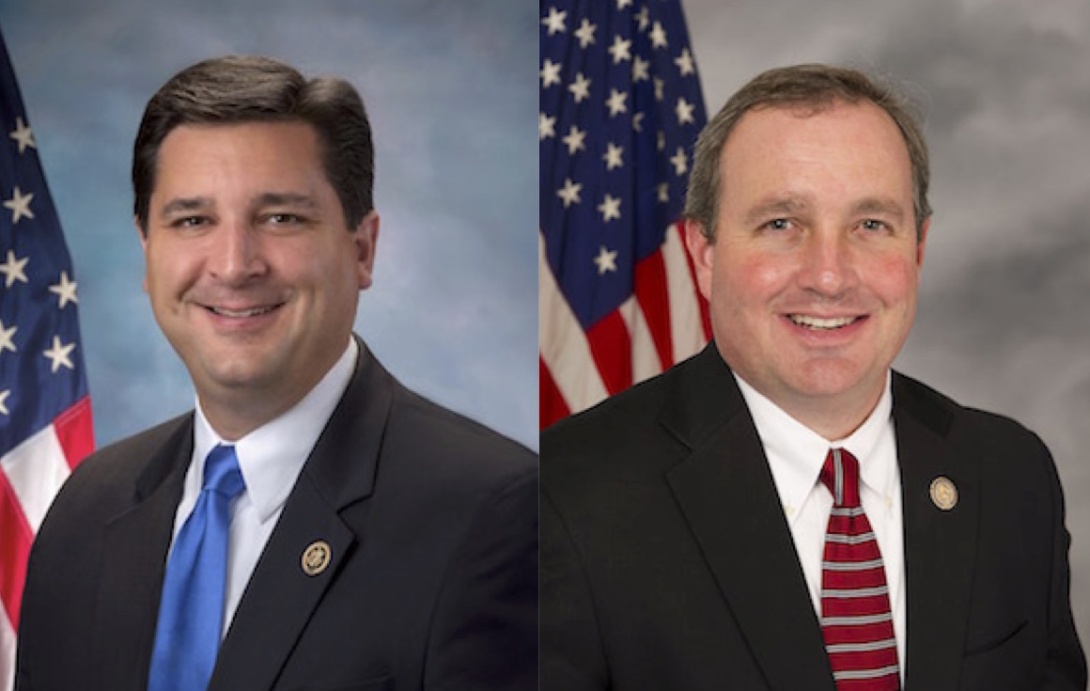Federal lawmakers buck home states to promote offshore oil and gas exploration

U.S. Reps. David Rouzer of North Carolina (left) and Jeff Duncan of South Carolina (right) are co-sponsors of a bill that would make it easier for companies to conduct seismic testing for offshore oil and gas deposits by weakening protections for marine mammals.
North Carolina and South Carolina have been hotbeds of local community resistance to federal proposals to open the Southeast's Atlantic Coast to oil and gas exploration and drilling.
Since 2014, when the latest push to open the Atlantic to drilling got underway in earnest, almost 30 communities along North Carolina's coast and more than 20 along South Carolina's have passed resolutions or otherwise taken stances against seismic testing for offshore oil and gas reserves and/or offshore drilling. While the Obama administration canceled plans to include the Atlantic in the latest five-year offshore drilling plan, the Trump administration is revisiting that decision.
Since then, responding to the strong grassroots opposition in their states, North Carolina Gov. Roy Cooper (D) and South Carolina Gov. Henry McMaster (R) have come out against seismic testing and drilling off their coasts. Federal law governing offshore oil and gas development gives special consideration to a governor's position.
But members of their states' congressional delegations are co-sponsoring a bill that would do an end run around the will of their governors and coastal communities.
U.S. Reps. David Rouzer, a Republican who represents coastal North Carolina's 7th Congressional District, and Jeff Duncan, a Republican who represents inland South Carolina's 3rd Congressional District, have signed on to the Streamlining Environmental Approvals (SEA) Act of 2017 (HR 3133). The measure would amend the Marine Mammal Protection Act of 1972 (MMPA) to weaken standards for issuing what are known as "Incidental Harassment Authorizations" — permits for activities that have the potential to injure dolphins and whales or disrupt their behavioral patterns.
Such permits are needed by companies to carry out offshore seismic testing, which involves the intensive use of extremely loud airguns that can injure marine life and harm fisheries. The blasts take place every 10 seconds or so around the clock for months on and and can approach sound levels as loud as 250 decibels, damaging marine mammals' hearing and interfering with breeding and communication.
In 2015, 75 leading marine scientists wrote a letter calling on then-President Obama to reject seismic testing in the Atlantic over concerns about its harm to ocean life. Last year, 28 marine biologists raised specific concerns about its effects on the North Atlantic right whale, among the planet's most endangered marine mammals.
HR 3133 was introduced in late June by Rep. Mike Johnson, a Louisiana Republican. Besides Duncan, the other original co-sponsors, all Republicans, were Jody Hice of Georgia and three other Louisiana lawmakers: Ralph Lee Abraham, Garret Graves and Clay Higgins. Rouzer signed on later, on July 20.
The conservation group Oceana has documented how HR 3133 reflects changes to the MMPA that have been sought by the International Association of Geophysical Contractors (IAGC), the trade association for companies that carry out oil and gas exploration using seismic airgun blasting and other technologies.
For example, last October the IAGC handed out a fact sheet at a congressional hearing calling for the same changes made by HR 3133. IAGC President Nikki C. Martin also discussed the changes in testimony delivered last month to the Oversight and Investigations Subcommittee of the House Natural Resources Committee. HR 3133 sponsor Johnson submitted questions for the hearing record that point to IAGC's involvement in drafting the bill.
"This is especially important as similar efforts to undermine the MMPA unfold in the White House," said Oceana spokesperson Dustin Cranor.
Those efforts include President Trump's executive order implementing what he calls an "America-First Offshore Energy Strategy," which specifically addresses promoting seismic surveys and expediting incidental harassment authorizations, as well as a proposal from the National Oceanic and Atmospheric Administration to streamline the same section of the MMPA that would be amended by HR 3133.
When Johnson introduced the SEA Act in June, the IAGC issued a statement praising the move, saying it would "provide a much-needed common-sense approach" to ensure that offshore energy exploration "can move forward."
While the seismic testing industry is not a major player when it comes to spending to influence Congress, the oil and gas industry that it works for is — and Rouzer and Duncan are both beneficiaries of its largesse.
The oil and gas industry is among the top industry contributors to Rouzer's campaign and leadership committee, having contributed over $85,000 since he first ran for Congress in 2011. It's also the top industry contributor to Duncan's campaign and leadership committee, donating $165,000 since 2009, and it's his top industry contributor in this current election cycle.
Neither Rouzer's nor Duncan's office responded to a request for comment.
Tags
Sue Sturgis
Sue is the former editorial director of Facing South and the Institute for Southern Studies.
